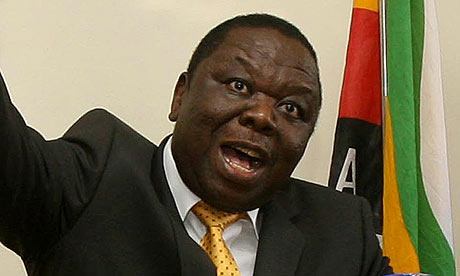
PRIME Minister Morgan Tsvangirai’s Movement for Democratic Change will insist on the full implementation of the agreed reforms before elections are held in accordance with a Constitutional Court judgement delivered on Friday.
BY PATRICE MAKOVA
The MDC-T national standing committee held an emergency meeting yesterday and resolved that there were serious misgivings on some of the aspects of the judgement.
“The party reiterated that the date of the election must be process driven. In other words, it must be dependent upon the completion of key processes that have a bearing on the freeness and fairness of the election,” said party spokesperson Mwonzora.
“These processes include the completion of the ward-based, transparent and accessible voter registration exercise targeting all communities. After the voter registration exercise, there must be a period set for the inspection of the voters roll to make sure that it is correct and that all eligible voters are on it.”
He said the MDC-T would also insist that media reforms which should guarantee reasonably equal and fair access by all contesting parties to the state media as enshrined in the new Constitution, must be completed before the election to ensure that there is an even playing field during the elections.
Mwonzora however said the MDC-T would abide by the Constitutional Court ruling directing elections to be held by July 31 of this year.
“For the avoidance of any doubt, the MDC is ready for free and fair elections in Zimbabwe. That means for the MDC, the issue is not about the date of the elections, is about the conditions under which these elections are held,” he said.
- Chamisa under fire over US$120K donation
- Mavhunga puts DeMbare into Chibuku quarterfinals
- Pension funds bet on Cabora Bassa oilfields
- Councils defy govt fire tender directive
Keep Reading
Zanu PF national chairman Simon Khaya-Moyo said his party welcomed the ruling and urged the nation to prepare for elections.
Mwonzora said the Constitutional Court ruling did not absolve President Robert Mugabe from completing the key processes that have a bearing on the freeness and fairness of the election. He said Zimbabwe has been plagued by state-sponsored violence in past elections.
“To that end, reforms to ensure the total eradication of all forms of state-sponsored violence must be completed first,” he said.
Mwonzora said although Chapter 11 of the new Constitution provided for security sector reform by stipulating that members of security services must not act in a partisan manner, a code of conduct must be drafted to govern their behaviour during the elections.
He said it was critical that Zimbabwe completes all legislative reforms to bring all legislation which have a bearing on elections into conformity with the Constitution. These include the Electoral Act, the Public Order and Security Act, the Access to Information and Protection of Privacy Act.
Tsvangirai on Friday accused the Constitutional Court of overstepping its mandate saying it had no power to set an election date.
“In the true spirit of separation of powers, an election date remains a political process in which the executive has a role to play,” he said.
Southern African Political Series (Sapes) executive director, Dr Ibbo Mandaza said his organisation would on Tuesday host some of the best constitutional lawyers in the country for a discussion on the full implication of the court ruling.
According to legal experts, Schedule Six of the new Constitution stipulates that at least 30 days are required for an intensive voter registration and voters roll inspection. The exercise is set to begin tomorrow ending beginning of July.
Section 157 (3) of the Constitution also stipulates that the nomination of candidates should take place 14 days after the publication of the proclamation for elections, with polling taking place at least 30 days after the nomination process.
Mugabe still had four months to call for election: Law expert
Constitutional law expert, Professor Greg Lennington said he was astounded by the ruling.
He said in terms of the Constitution, after the expiry of Parliament, the President has four months to call for elections.
“I have not yet seen the reasons for the judgement, but the correct decision was that of the two dissenting judges, Justices Bharat Patel and Luke Malaba,” he said.
Seven of the nine judges who sat as a Constitutional Court concurred with the ruling. The seven who ruled in favour of the application brought by a Harare man, Jealousy Mawarire are: Chief Justice Godfrey Chidyausiku and Justices Vernanda Ziyambi, Paddington Garwe, Ann-Mary Gowora, Ben Hlatshwayo, George Chiweshe and Antonia Guvava. The two dissenting opinions were by deputy Chief Justice Malaba and Justice Patel.
Mawarire, a registered voter in Zaka and of the Centre for Elections and Democracy in Southern Africa, had approached the Constitutional Court to compel Mugabe to fix the election dates in view of the fact that the life of the current 7th Parliament ends on July 31.











